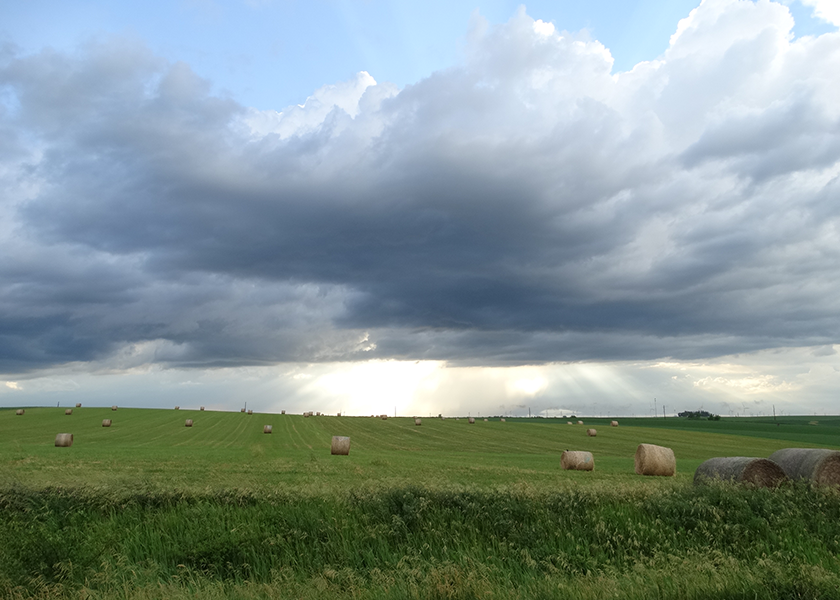Evening Report | November 20, 2023

Check our advice monitor on ProFarmer.com for updates to our marketing plan.
Winter wheat conditions increase slightly…USDA rated 48% of the U.S. winter wheat crop as “good” to “excellent,” up one percentage point from the previous week. Traders expected no change in conditions. The portion of the crop rated “poor” to “very poor” was unchanged at 17%.
|
|
This week |
Last week |
Year-ago |
|
Very poor |
7 |
7 |
15 |
|
Poor |
10 |
10 |
18 |
|
Fair |
35 |
36 |
35 |
|
Good |
39 |
39 |
27 |
|
Excellent |
9 |
8 |
5 |
USDA reported winter wheat planting was 95% complete, one point behind the five-year average, while emergence stood at 87% complete (85% on average).
Corn harvest winds down…USDA reported 93% of the corn crop was harvested as of Sunday, a five-point advance from the previous week and two points ahead of average.
Cotton harvest advances to 77% complete…USDA reported cotton harvest progressed ten percentage points from a week ago and is six points ahead of the five-year average. Harvest stood at 68% in Texas (63% average) and 67% in Georgea (71%).
EPA proposals on ESA commitments worry soybean farmers…Proposals from the Environmental Protection Agency (EPA) regarding its commitments under the Endangered Species Act (ESA) related to pesticides have raised concerns among soybean farmers, according to the American Soybean Association (ASA). It says one of the proposals alone could potentially restrict or eliminate pesticide use on nearly 13 million acres of cropland, including over 5 million acres of soybeans. Link to ASA analysis.
The Vulnerable Species Pilot Project (VSPP) proposed by EPA aims to streamline the ESA compliance process for growers. However, this project would require extensive efforts to protect specific endangered species within predetermined areas to achieve ESA compliance, without waiting for individual species evaluations. The VSPP areas proposed by EPA are based on the ranges of 27 endangered species in the continental United States. EPA has indicated that additional species with larger ranges may be included in future pilot expansions.
Under the VSPP proposal there would be "avoidance areas" covering over 20 million acres with strict pesticide application restrictions, requiring prior consent from the Fish and Wildlife Service months in advance. Additionally, there would be "mitigation areas" where pesticide bans would not be outright but would involve various hurdles for farmers to navigate to continue pesticide use.
The proposed mitigation measures vary depending on the species, region, and crop type, adding layers of complexity and cost. The financial impact on landowners and farmers in the program could be severe, with some areas potentially becoming unsuitable for agriculture due to the inability to use pesticides or the high cost of mitigations.
Impact: EPA's broad approach to ESA compliance may result in the removal of hundreds of thousands to millions of acres of farmland from production, according to ASA analysis. The VSPP has not been finalized yet, and EPA has until Sept. 30, 2024, to determine if the proposal should be expanded. The ASA suggests that the EPA consider alternative measures that protect endangered species while also supporting the livelihoods of farmers and agricultural productivity.
POET concerned Biden's tax credit decision may force exit from SAF market…POET, a biofuel maker, expressed concerns that the Biden administration's decision on tax credits for sustainable aviation fuel (SAF) could lead them to withdraw from the SAF market. The company has received significant interest in developing low-carbon projects with airlines and fuel producers in the SAF market. However, the economic feasibility of these projects is heavily dependent on the value of the tax credits proposed by the White House.
Background: Biofuel advocates have been urging the administration to establish a model that favors corn-based ethanol as a feedstock for SAF credits. Without favorable tax credits, POET may find it economically unfeasible to continue operating in the SAF sector, and political support for a more sustainable SAF policy could diminish. The Biden administration is expected to provide guidance on the tax credits in December.
USDA today begins reporting on number of hogs…raised in compliance with animal confinement legislation (ACL), such as California's Proposition 12, for the first time. Prop 12 requires that pork produced on farms outside California provides breeding sows with at least 24 square feet of floor space, the same as required within the state.
This new classification will be included in the National Weekly Direct Swine Non-Carcass Merit Premium report, according to the Agricultural Marketing Service (AMS). Until now, ACL-compliant hogs were categorized as "other," which included hogs raised under various programs focusing on animal welfare, antibiotics, diet, genetics, meat quality, process verification, sow housing, and weight. The volume of ACL-compliant hogs under federal livestock reporting laws has grown large enough to warrant a separate listing, as per AMS.
USDA said this addition will provide valuable information to stakeholders in the pork industry, allowing them to make informed decisions related to ACL-compliant hogs. The National Pork Producers Council has been involved in advocating for this reporting and has stayed engaged with the USDA's Agricultural Marketing Service throughout the process. California has set Jan. 1 as the compliance date for Prop 12.
Bayer AG suffered its largest market value loss ever…amounting to approximately €7.6 billion ($8.3 billion). This decline follows significant legal setbacks and drug development challenges, putting pressure on the company's new leader to devise a turnaround strategy. Five years after Bayer's $63 billion acquisition of Monsanto Co., the negative impact of the deal continues to grow. Ongoing litigation related to Monsanto's weedkiller Roundup poses a significant financial risk to Bayer, especially after a recent unfavorable jury verdict that may require Bayer to utilize all or even more than the $16 billion it has allocated for Roundup lawsuits. Simultaneously, Bayer is facing a crisis in its pharmaceutical division due to the suspension of a crucial study for its most important experimental drug due to efficacy concerns.
Shares fell as much as 21% in Frankfurt trading. As a result, Bayer's market valuation has shrunk to approximately $37 billion, less than half of what it paid for Monsanto and allocated for legal issues stemming from the acquisition. Bill Anderson, who took over as CEO earlier this year, is now under increased pressure to consider breaking up the conglomerate, which includes pharma, agriculture, and consumer health divisions. Bayer's Monsanto unit has recently faced multiple jury verdicts linking Roundup to cancer. While Bayer intends to appeal these verdicts and maintain the product's safety, the legal risks may complicate any potential spin-off of the agriculture division.
China's sow herd declines for tenth consecutive month…Data from the Chinese Ministry of Agriculture and Rural Affairs revealed that China's sow herd has decreased to 42.1 million, down from 42.4 million in September, marking a tenth consecutive month of declines. However, state broadcaster CCTV indicated that the government still considers this level to be higher than necessary, as pork consumption has been lower than anticipated, and productivity has continued to rise. This situation has put pressure on hog prices in China, which are now 42% lower than they were a year ago.
The ministry has stated its intention to "stabilize" the situation and encourage a more reasonable level of production. However, specific details about the policy shifts that may be implemented to achieve this goal have not been provided.
Taiwan export orders fall the least in 13 months…In October 2023, orders for Taiwanese exports declined by 4.6% compared to the previous year, reaching a total of $52.87 billion. This marked a significant improvement from the steep 15.6% drop observed in September and was slightly better than market expectations, which had predicted a 4.93% decline. It represents the smallest decrease in export orders since the ongoing contraction sequence began in September 2022.
A Chinese firm has announced it will build a renewable energy project…with more generating capacity than New Zealand in a vast inland desert province. Link to details via Bloomberg.
India, the world’s top rice exporter, is expected to maintain its curbs…on overseas sales well into next year, a move likely to hold the staple grain at close to its highest price levels since the food crisis of 2008. Link to more via Bloomberg.






